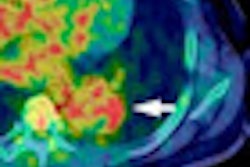A study presented at last month's American Academy of Neurology (AAN) annual meeting showed that adding PET to the clinical investigation of atypical or unclear dementias led to a change of 29% of the initial diagnoses.
The results prompted researchers to recommend more routine use of PET for clarifying ambiguous dementia diagnoses.
Previous studies have indicated that adding PET increases diagnostic sensitivity and accuracy (e.g., Neurology, August 2007, Vol. 69:9, pp. 871-877). However most of these studies involved typical dementias, for which neuroimaging is not usually used.
Dr. Robert Laforce Jr., of the Memory Clinic at the Quebec City-affiliated University Hospital Centre, and colleagues set out to determine whether PET may, in fact, be most useful in complex and atypical/unclear dementia cases. To this end, they analyzed the files of 94 patients seen at the Memory Clinic between 2006 and 2008.
Thirty-seven of the patients had been initially diagnosed with atypical/unclear dementias, 28 with Alzheimer's disease or frontotemporal dementia and 17 with mild cognitive impairment (MCI). Seven of the remaining 12 patients had psychiatric illnesses and the others had been diagnosed with vascular dementia, corticobasal degeneration, or dementia with Lewy bodies.
Forty-one of the patients were men, and their average age at diagnosis was 64.7 years. Each patient had undergone a PET scan and then a subsequent diagnostic re-evaluation.
There was only a 5.4% concordance rate between the initial clinical diagnoses and the nuclear medicine physician's diagnosis in cases that were initially deemed to be atypical or unclear dementias.
Furthermore, the investigators found that while PET confirmed the initial clinical diagnoses in more than 90% of cases of Alzheimer's disease or frontotemporal dementia, it changed the diagnosis in 59.5% of the atypical/unclear dementias and in 17.5% of the patients initially deemed to have mild cognitive impairment.
Almost 30% of the patients initially believed to have atypical/unclear dementias were instead found to have the hypometabolism pattern associated with Alzheimer's disease.
"The bottom line is that we shouldn't order PET for typical Alzheimer's disease or frontotemporal dementia, but we shouldn't hold it back for atypical/unclear cases," Laforce told AuntMinnie.com.
By Rosemary Frei
AuntMinnie.com contributing writer
May 3, 2010
Related Reading
MRI hippocampal measurement doesn't predict cognitive decline, April 26, 2010
PET finds risk factor for Alzheimer's in Latinos, April 15, 2010
MR scans may detect signs of early dementia in elderly, April 14, 2010
Brain scans show signs of early Alzheimer's: study, March 16, 2010
PET detects Alzheimer's disease likely to progress, December 15, 2009
Copyright © 2010 AuntMinnie.com




















